Table of Contents
Introduction of healthy veggie burger recipes
Discover a selection of healthy veggie burger recipes that are packed with flavor and simple to prepare. Perfect for anyone aiming to eat more plant-based meals, these recipes offer the perfect balance of nutrition and taste.
This guide taps into the rising interest in wholesome, sustainable eating, reflecting a broader shift toward plant-based diets. Each recipe is crafted to be versatile, featuring ingredients like grains, beans, fresh vegetables, and spices,perfect for creating plant-based burger recipes adaptable to your dietary preferences. Designed with both taste and nutrition in mind, these veggie burgers are lower in calories and saturated fats compared to traditional meat options, letting you enjoy a healthier alternative without missing out on flavor.
Additionally, the guide encourages opting for whole-food ingredients, offering a fresh approach to veggie burgers by steering clear of overly processed options. Each recipe is created for accessibility, with straightforward instructions and ingredient lists that cater to all cooking levels. Plus, you’ll find tips for grilling, baking, and stovetop methods to make preparation even easier.
Get creative with toppings and sides to make each meal uniquely yours. This guide is your ultimate resource for enjoying flavorful, health-conscious veggie burgers that make plant-based eating a pleasure rather than a compromise.
Creating a flavorful and nutritious veggie burger involves a variety of ingredients, allowing for customization based on personal preferences and dietary needs.
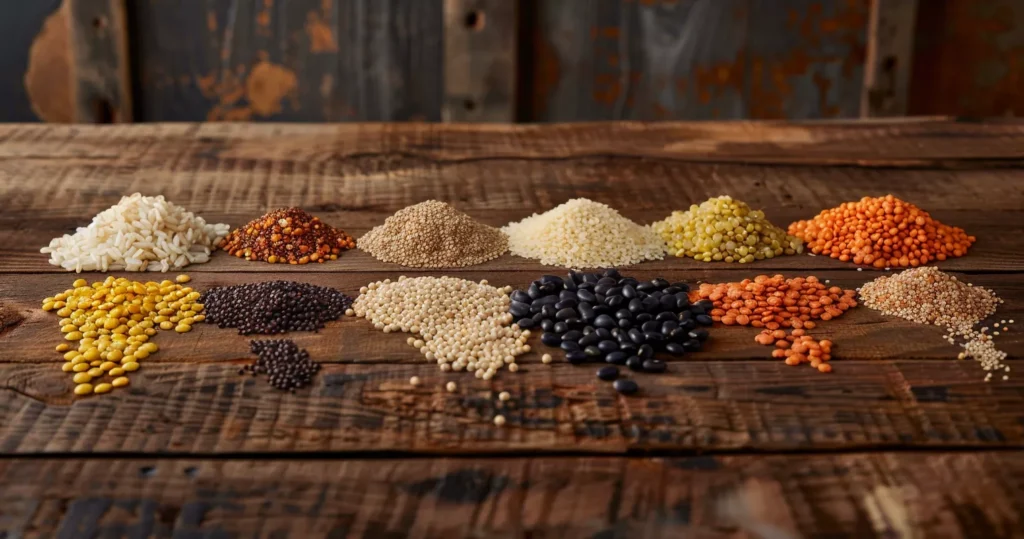
Base Ingredients for Healthy Veggie Burger Recipes
To create healthy veggie burger recipes, start with nutritious and balanced base ingredients. Grains, beans, and fresh vegetables form the foundation of these recipes, offering a blend of textures and flavors that make each burger satisfying.
Grains
A mix of grains serves as the foundation for veggie burgers.
- Brown rice
- Quinoa
- Barley
- Lentils
- Farro or couscous can also be used for added texture and flavor
Beans
Beans add essential protein to healthy veggie burger recipes. and help bind the ingredients together.
- Black beans
- Chickpeas
- Cannellini beans
These beans can be rinsed and dried to enhance their texture before incorporating them into the mix.
Binding Agents for Healthy Veggie Burger Recipes
Flour and Breadcrumbs
In healthy veggie burger recipes, achieving the right consistency is essential, and various flours and breadcrumbs can be used as binding agents.
- Oat flour
- Panko breadcrumbs
- Whole grain or gluten-free options depending on dietary restrictions
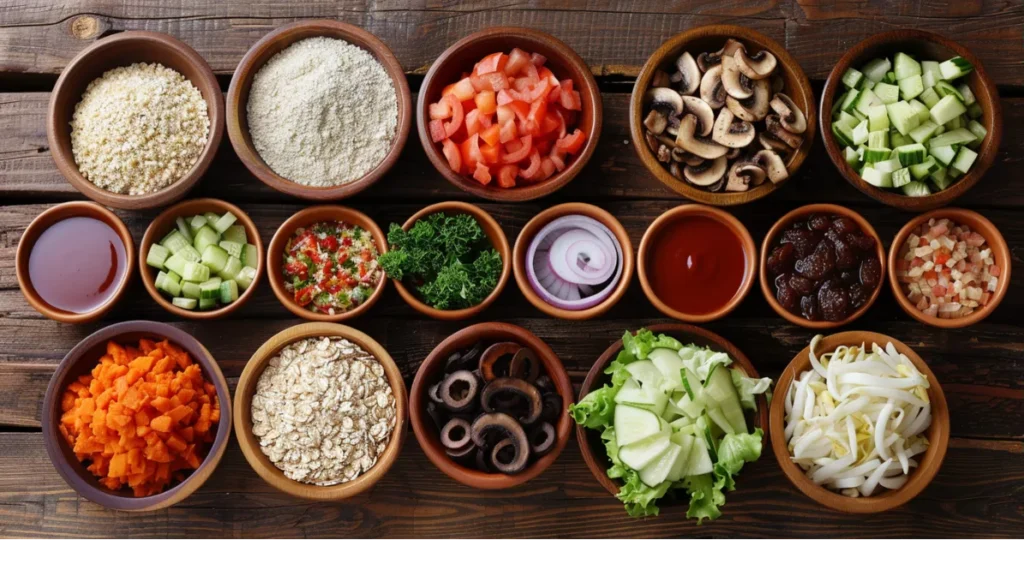
Vegetables and Seasonings
The key to healthy veggie burger recipes lies in flavorful seasonings that enhance the natural taste of vegetables.
Fresh and Dried Ingredients
Adding vegetables brings moisture and flavor to the patties.
- Sautéed mushrooms
- Shredded zucchini
- Onions and garlic
Additionally, spices like cumin, paprika, and chili powder can be added to enhance the taste.
Sticky and Sweet Elements
For texture and taste, a combination of sticky and sweet ingredients can be introduced, such as:
- Cooked sweet potato
- Chopped raisins or prunes
This mixture often follows a 4:1 ratio for a savory-sweet balance.
Sauce and Toppings
To serve the veggie burgers, various toppings can be added, including:
- Special sauces (ketchup, mustard, and mayonnaise combinations)
- Lettuce, tomato, and onion for freshness
With these ingredients, veggie burgers can be tailored to fit individual preferences while maintaining a healthy profile.
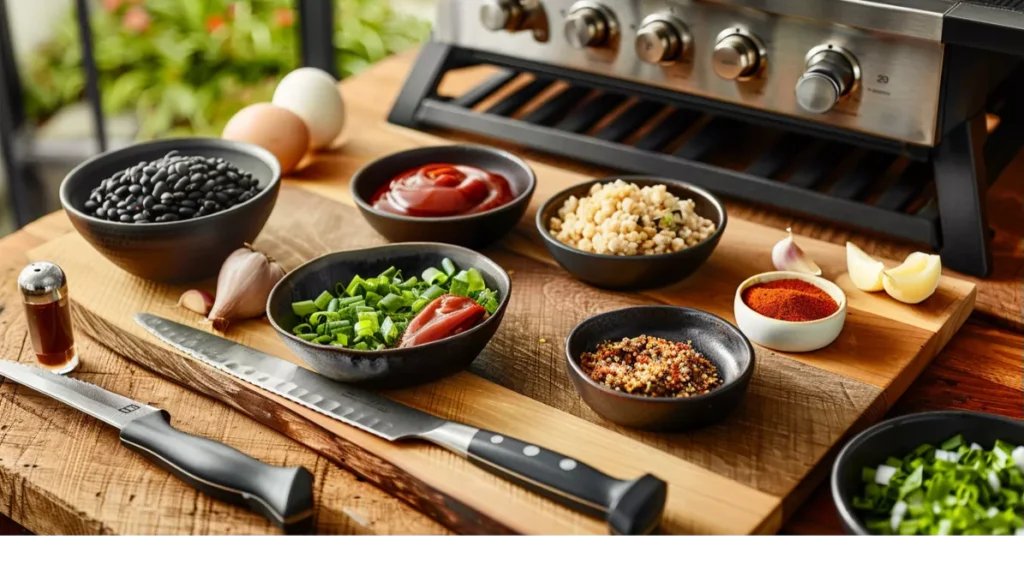
Collection of Vegetarian Burger Recipes
Our collection of healthy veggie burger recipes includes a variety of options, such as black bean burgers and unique, customizable vegetarian patties.
Black Bean Burgers
This black bean burger is a perfect addition to our healthy veggie burger recipes collection.
To make delicious black bean burgers, here’s a list of essential ingredients and tools:
Tools:
Cutting board, chef’s knife, medium bowl, potato masher, large chef’s ring, or burger press.
Ingredients:
- Black beans,
- scallions, garlic,
- ketchup,
- soy sauce,
- miso paste,
- cumin,
- smoked paprika,
- egg, breadcrumbs,
- oil for brushing.
Preparation Steps
- Gather all tools and ingredients.
- Chop scallions and garlic finely.
- Begin preheating the grill.
Cooking Instructions
- In a large bowl, combine the black beans, scallions, garlic, ketchup, soy sauce, miso paste, cumin, and smoked paprika. Lightly mash with a potato masher to maintain some texture.
- Add the egg, stir to combine, and gradually mix in breadcrumbs until the mixture holds together. Season with salt and black pepper to taste.
- Divide the mixture into four portions (about 5–6 ounces each) and form into patties with a burger press or chef’s ring. Lightly brush each side with oil before grilling.
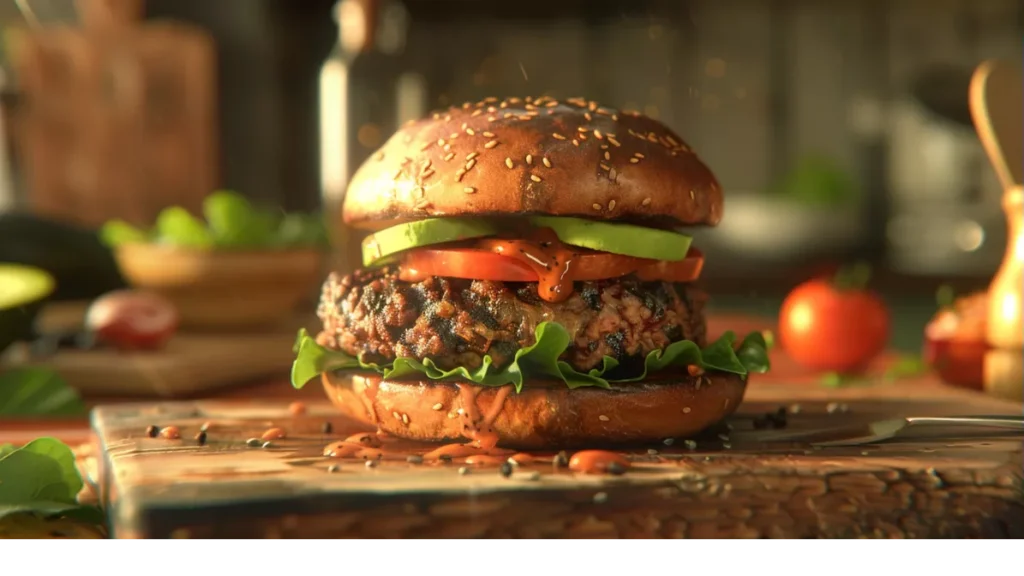
These black bean burgers pair well with toppings like lettuce, tomato, pickles, avocado, or spicy sriracha mayo and go perfectly with sweet potato fries or a fresh salad for a balanced meal.
Four-Bean Relish
This tangy, nutritious four-bean relish is a great choice for a barbecue side or a flavorful lunch. For a vegan twist, replace honey with agave nectar or maple syrup.
Asian Noodle Salad
A cold noodle salad with a burst of flavor, ready in just 35 minutes. Key ingredients like hot chili oil, hoisin, and sesame oil make it ideal for easy midweek meals.
Fried Plantains
Sweet fried plantains add a unique flavor to any dish, blending a delightful mix of sweetness and heat.
Chickpea Cakes
These chickpea patties, similar to falafel, can be baked or air-fried, creating a crispy outside and soft interior with sun-dried tomatoes and spices for added taste.
Chipotle Black Bean Burger
A spicier take on the classic black bean burger, inspired by the MorningStar version, with bold spices like cumin and smoked paprika, ideal for grilling or pan-frying.
By trying out these recipes, you’ll discover a variety of tasty, healthy veggie burgers tailored to different flavor preferences and dietary needs.
Unique Vegetarian Burger Recipes
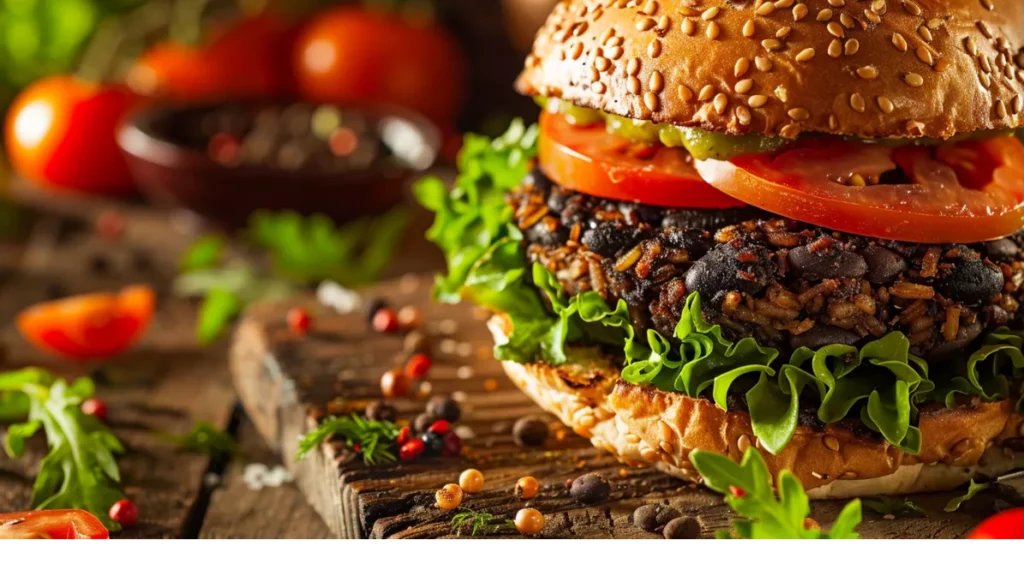
Wholesome Vegan Black Bean Burger
One of the most flavorful and nutritious options is the Wholesome Vegan Black Bean Burger. This burger combines black beans and brown rice, seasoned with a vibrant blend of spices to create a satisfying texture and taste experience. The recipe is straightforward, featuring a clear list of ingredients and step-by-step instructions. It also includes nutritional information and practical tips for storing and reheating these homemade veggie burgers, making it perfect for both seasoned vegans and those new to plant-based eating.
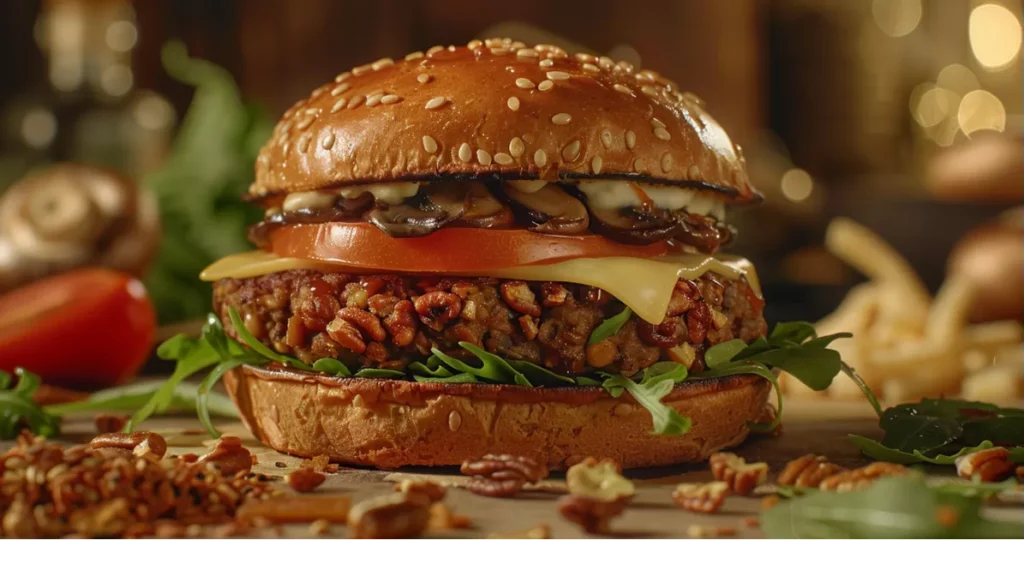
Gourmet Shiitake and Portobello Mushroom Burger
This gourmet option is one of our most flavorful healthy veggie burger recipes, blending mushrooms with a hearty texture. this irresistible choice is the Shiitake and Portobello Mushroom Burger, which perfectly balances flavor and texture. Key ingredients like mushrooms, farro, pecans, and panko breadcrumbs combine to create a hearty and satisfying patty. This recipe is ideal for those looking for a gourmet burger experience and can be adjusted to fit various dietary preferences.
Side Dishes and Toppings for our easy vegan burgers
Serving Suggestions
Pairing these healthy veggie burger recipes with the right side dishes enhances the meal. Here are some serving suggestions for a well-balanced experience.
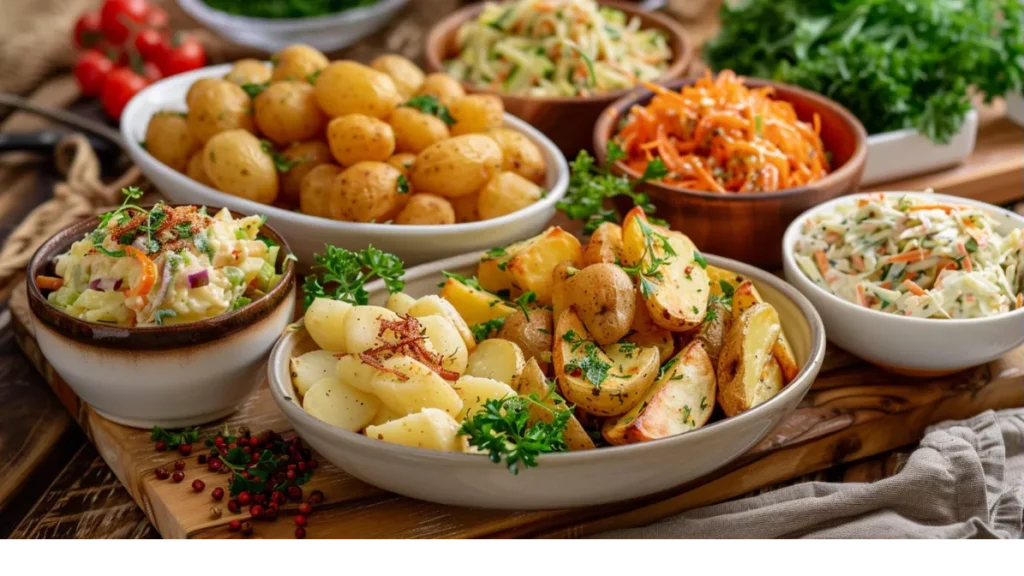
Veggie burgers pair well with a variety of side dishes:
- Oven-Roasted Potato Wedges: Crispy on the outside and soft inside, they add a satisfying crunch.
- Easy Air Fryer Fries: A healthier alternative to traditional fries, offering a crispy texture with less oil.
- Vegan Potato Salad: Creamy and refreshing, this side provides a cooling contrast to savory burgers.
- Vegan Caesar Salad: Packed with greens and tangy dressing, this salad brings a nutritious crunch.
- Classic Vegan Coleslaw: A tangy slaw enhances burger flavors and adds a crunchy texture.
Toppings
Add a variety of toppings to these healthy veggie burger recipes to make each meal unique. Toppings play a key role in making veggie burgers more enjoyable:
- Lettuce: Adds a fresh, crunchy element.
- Tomato: Juicy slices help balance the flavors.
- Grilled Onions: Sweet and savory, they add depth to the flavor profile.
- Cheese: Vegan cheese options melt nicely on patties.
- Guacamole: Adds a creamy, rich texture.
- Condiments: Ketchup, mustard, BBQ sauce, and garlic mayo add zest and moisture.
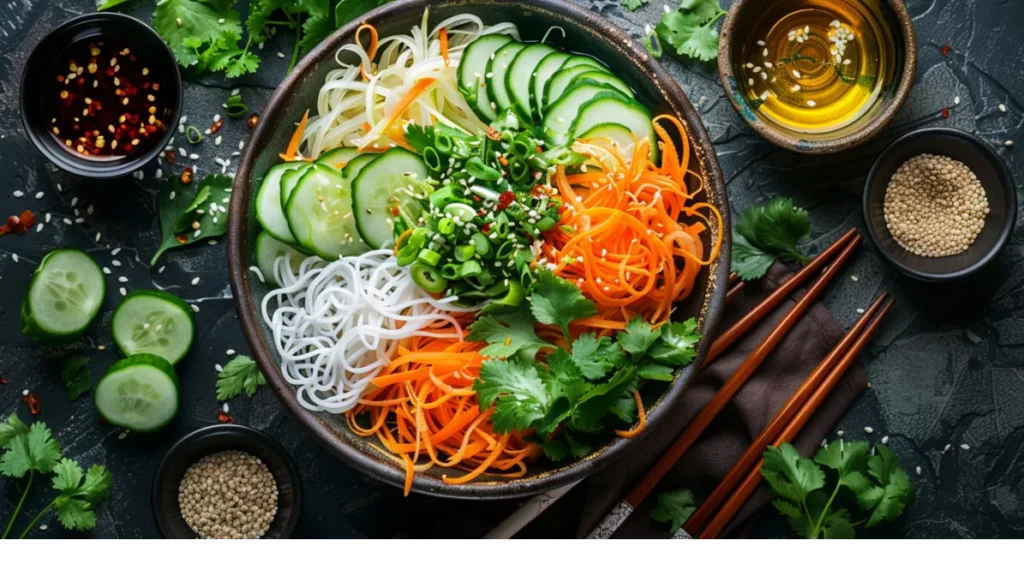
Asian-Inspired Cold Noodle Salad
For a refreshing side or light meal, try the Asian-Inspired Cold Noodle Salad, ready in just 35 minutes. This dish is packed with flavor from ingredients like hot chili oil, hoisin, and sesame oil, making it a vibrant accompaniment to any burger or a standalone option for a lighter meal.
Versatile Flavor Additions
In addition to these main recipes, various toppings can elevate your veggie burger experience. Consider options like hummus mixed with chopped apples, cashew cream, lemon tahini sauce, or even Greek tzatziki made with soy yogurt, minced garlic, and dried dill. Exploring global flavors can enhance your burgers further, such as adding falafel for a Middle Eastern twist or mango chutney for an Indian-inspired flavor.
Customizable Burger Mix
A highly adaptable burger base lets you get creative with ingredients. You can mix options like black beans, quinoa, and mushrooms to create a rich, hearty texture. Adjust the spices and additional ingredients to match your taste preferences, ensuring each burger is uniquely delicious.
These diverse and easy-to-follow recipes are an ideal starting point for anyone wanting to enjoy tasty, healthy veggie burgers.
By choosing the right combination of sides and toppings, you can create a satisfying, well-rounded meal that showcases the delicious flavors of veggie burgers and caters to various tastes.
Health Benefits
One of the major appeals of these healthy veggie burger recipes is their health benefits, offering lower calories and less saturated fat compared to traditional burgers. They are often lower in calories and saturated fats, which can promote heart health and support weight management. Many veggie burgers are made from nutrient-dense ingredients like legumes, vegetables, and whole grains, providing essential vitamins and minerals.
Nutritional Advantages of Vegetarian Burger Recipes
Legumes, commonly used in veggie burgers, are high in fiber, which is essential for digestive health. They also help regulate blood sugar, making them a good option for people with diabetes. For example, black beans, a common ingredient in these recipes, are low in cholesterol and rich in calcium and magnesium, which support bone strength and may help lower blood pressure. Additionally, many veggie burgers are enriched with heart-healthy ingredients like flaxseeds and quinoa, enhancing their nutritional profile and offering added health benefits. These ingredients can help lower LDL cholesterol levels and reduce the risk of cardiovascular disease, an important benefit as heart disease remains a leading cause of death in the United States.
Calorie and Fat Considerations of Vegetarian Burger Recipes
Compared to traditional beef burgers, veggie burgers are generally lower in calories and unhealthy fats. While beef burgers can contain between 250 and 500 calories depending on size and preparation, veggie burgers tend to offer a lighter option, making them favorable for those aiming to maintain a balanced diet. However, it’s essential to check the nutritional information on packaged options, as some veggie burgers may contain added oils or fats that can increase calorie content.
Cooking Techniques for Healthy Veggie Burger Recipes
These cooking techniques ensure that your plant-based burger recipes turn out delicious, whether grilled, baked, or cooked on the stovetop.
Grilling for Vegetarian Burger Recipes
Grilling is a popular method for cooking veggie burgers, adding a smoky flavor and a satisfying char. Begin by heating the grill to medium-high and lightly coating the grates with oil to keep the patties from sticking. For optimal results, brush the patties with olive oil and press down gently with a spatula while cooking. Grill each side for about 6 to 7 minutes, or until nicely charred and cooked through, reaching an internal temperature of at least 160°F (71°C). If you’re using a grill basket, it can help keep the shape of more delicate veggie burgers.
Stovetop Cooking for Vegetarian Burger Recipes
Cooking veggie burgers on the stovetop is another reliable technique. Begin by heating a little oil in a skillet over medium heat. Cook the patties for about 4 to 6 minutes on each side, or until they are golden brown and firm. This method allows for easy monitoring and flipping to ensure even cooking.
Baking for easy vegan burgers
Baking is a healthier alternative that requires less oil. To bake veggie burgers, preheat the oven to 375°F (190°C) and place the patties on a baking sheet lined with parchment paper. Bake for 13 to 15 minutes, flipping halfway through to achieve even browning. This method is especially useful for patties that may be too delicate for grilling.
Using a Food Processor
A food processor can streamline the preparation of veggie burger mixtures. Combine cooked legumes, such as black beans or chickpeas, with vegetables, spices, and binders like breadcrumbs or eggs. Pulse the mixture until it holds together but still has some texture, as over-processing can make it too soft. Once formed, it’s best to chill the patties in the fridge for at least 45 minutes to help them firm up before cooking.
Vegan Variations
For vegan options, you can replace eggs with a flaxseed mixture to bind the ingredients. Simply mix ground flaxseed with water and let it sit until it thickens, which will mimic the binding properties of an egg.
These methods make it easy to prepare delicious veggie burgers with just the right texture and flavor, customized to suit any preference.
Expert Reviews on Healthy Veggie Burger Recipes
Culinary Expert
A professional chef specializing in vegetarian cuisine, dedicated to creating veggie burger recipes that are healthy, flavorful, and easy to prepare. Their expertise includes crafting unique flavor combinations and using cooking techniques that enhance the natural qualities of each ingredient.
Q : What are the Key Ingredients that Contribute to the Flavor and Texture of a Successful Veggie Burger recipes?
A well-made veggie burger relies on a blend of key ingredients that bring out both flavor and texture. The foundation for a great veggie burger includes chopped soft vegetables, cooked grains, legumes, flavor and texture enhancers, spices, and a dry base.
- Chopped Soft Vegetables: Soft vegetables like mushrooms, bell peppers, onions, or zucchini add moisture and depth of flavor. Mushrooms are particularly beneficial as they contain glutamate, an amino acid that enhances umami, giving the burger a meatier taste.
- Cooked Grains: Grains like quinoa, brown rice, or bulgur form a solid base that helps the burger hold its shape. They add a slight chewiness, which contributes to the overall texture and helps make the burger more filling.
- Legumes: Beans and legumes, such as black beans, chickpeas, and lentils, are essential for binding the burger ingredients together. They’re also rich in protein and fiber, making the burger more nutritious.
- Flavor and Texture Enhancers: Ingredients like nuts, seeds, or nutritional yeast add depth of flavor and enhance texture. For instance, crushed nuts can create a firmer, meat-like texture, adding an extra bite.
- Spices: Spices are crucial for layering flavors. Common options include paprika, cumin, garlic powder, and smoked paprika, which add smoky and savory notes often associated with grilled meats.
- Dry Base: A dry base, like breadcrumbs, oats, or flour, helps absorb moisture from the vegetables and grains, preventing the burger from becoming too soft. This is essential for creating a burger that holds together well, whether it’s baked, pan-fried, or grilled.
Beyond the ingredients, the preparation method impacts the final result. For example, using a food processor can blend ingredients uniformly, giving the patty a consistent texture. Achieving a golden crust on the outside also enhances both the flavor and texture of the veggie burger. By carefully selecting and balancing these components, you can create a veggie burger that is not only flavorful and nutritious but also has a satisfying texture suited to different cooking methods.
Q : Can you share a few unique veggie burger recipes that highlight different flavor combinations or cooking techniques?
Absolutely! Exploring unique flavor combinations and cooking techniques can take veggie burgers to a new level of taste and satisfaction. Here are some recipes that showcase different approaches to creating veggie burgers packed with flavor:
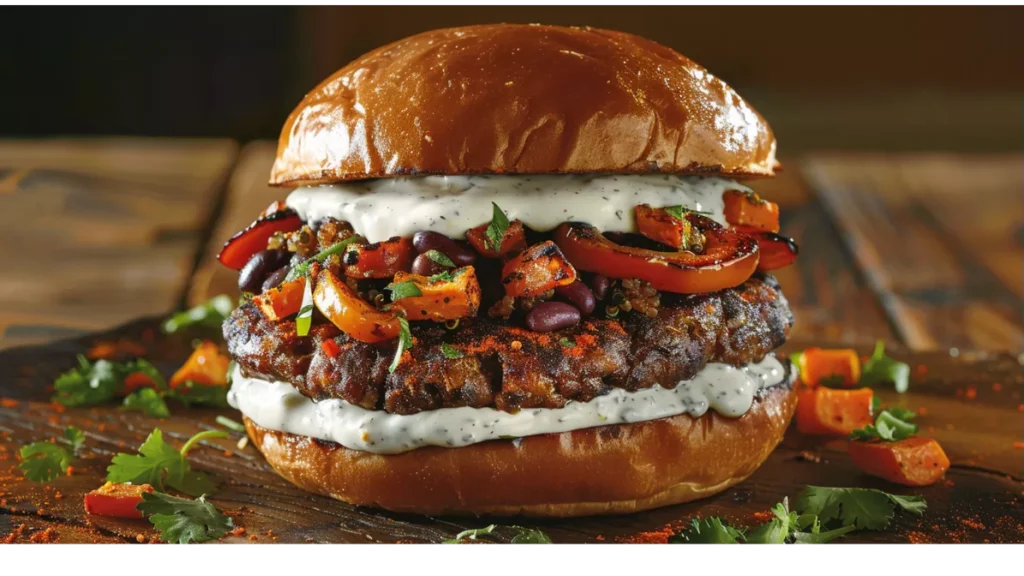
1. Smoky Roasted Veggie Burger
Roasting vegetables before adding them to the veggie burger mix enhances both flavor and texture. Roasting draws out a smoky, caramelized flavor and a satisfying chewiness.
Ingredients:
- Roasted carrots, sweet potatoes, and bell peppers
- Black beans
- Quinoa
- Smoked paprika and cumin
- Fresh cilantro
- Whole-grain burger buns
Instructions:
Roast the carrots, sweet potatoes, and bell peppers until they are tender and slightly caramelized.
- Mash the roasted vegetables with the black beans and quinoa.
- Season the mixture with smoked paprika, cumin, and fresh cilantro.
- Shape into patties and cook on a skillet until golden brown on both sides.
- Serve on whole-grain buns with your favorite toppings, such as avocado, pickled cucumbers, and a creamy sauce like tzatziki.
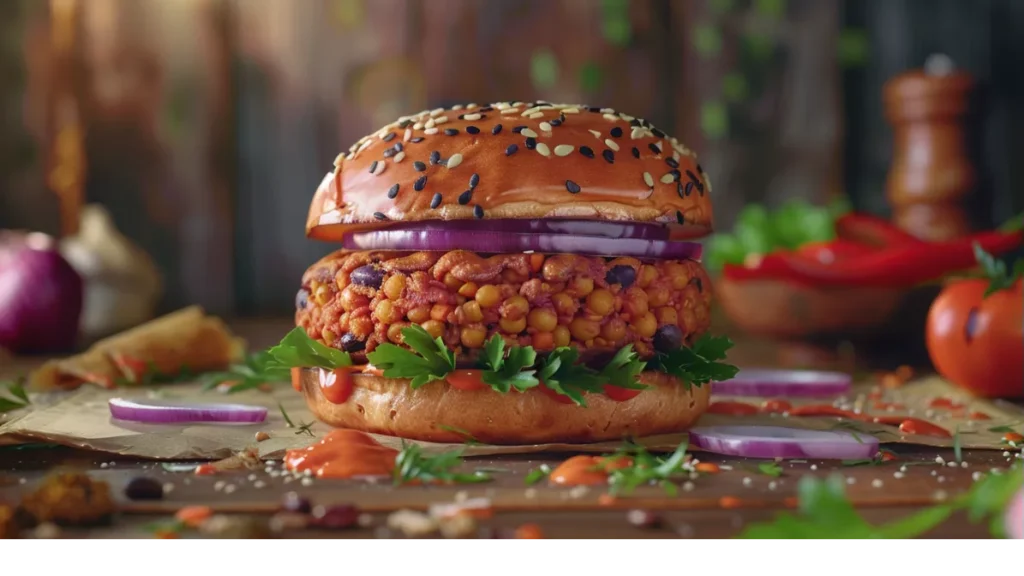
2. Spicy Bean and Grain Burger
Beans and grains make an excellent base for a hearty veggie burger. This recipe brings extra flavor by adding spices and herbs.
Ingredients:
- Chickpeas and black beans
- Cooked brown rice
- Red onion and garlic
- Chili powder, cumin, and coriander
- Fresh parsley
- Whole-wheat burger buns
Instructions:
- Blend the chickpeas and black beans until mostly smooth.
- Stir in the cooked brown rice, finely chopped red onion, and minced garlic.
- Season with chili powder, cumin, coriander, and chopped fresh parsley.
- Shape the mixture into patties and bake in the oven at 375°F (190°C) until firm and slightly crispy.
- Serve on whole-wheat buns with lettuce, tomato, and a spicy sauce like Sriracha mayo.
3. Savory Mushroom and Walnut Burger
For a rich, umami-filled burger, mushrooms and walnuts are a perfect pairing, bringing a unique depth of flavor.
Ingredients:
- Portobello mushrooms
- Walnuts
- Breadcrumbs
- Soy sauce and balsamic vinegar
- Thyme and rosemary
- Multigrain buns
Instructions:
- Finely chop the Portobello mushrooms and walnuts.
- Sauté the mushrooms until tender, then add the walnuts, breadcrumbs, soy sauce, and balsamic vinegar.
- Season with thyme and rosemary, stirring until well combined.
- Shape into patties and cook on a skillet until golden on both sides.
- Serve on multigrain buns with toppings like arugula, caramelized onions, and Dijon mustard.
These vegetarian burger recipes provide a range of flavors and textures, offering fresh ways to enjoy veggie burgers that are both nutritious and delicious.
Q : What Are the Ideal Ingredient Ratios for Achieving the Perfect Texture in These Unique Veggie Burger Recipes?
To get the ideal texture in each of these 10 flavorful, easy, and healthy veggie burger recipes, balancing ingredients is essential. Using this specific formula ensures that each burger holds together well, avoiding issues like dryness or excessive softness. Here’s the recommended ratio for creating perfectly textured veggie burgers:
- Basic Formula: A reliable base formula for veggie burgers includes:
- 2 cups chopped soft vegetables: Vegetables like mushrooms, bell peppers, and onions provide moisture and add depth of flavor.
- 1 cup cooked grains: Options like quinoa, brown rice, or barley offer a solid texture.
- 1 1/2 cups cooked legumes: Black beans, chickpeas, or lentils add protein and help bind ingredients together.
- 1/2 cup flavor and texture boosters: Nuts, seeds, or breadcrumbs add extra texture and enhance flavor.
- 3 teaspoons of spices: Customize spices based on your preferred flavor profile, such as cumin, smoked paprika, or garlic powder.
- 1/2 cup dry base: Use oats, breadcrumbs, or flour to absorb excess moisture and prevent a mushy texture.
- Achieving a Meat-Like Texture: For a heartier, meat-like texture, mushrooms are an excellent choice as they contain natural glutamate, which brings a rich umami flavor. Adding ground nuts like tamari almonds or cashews can also enhance the firmness and chewiness, providing a satisfying bite.
- Binding and Cohesion: To ensure the burger holds together, a binding agent is crucial. Options include eggs or a vegan substitute like a flax egg (a mix of ground flaxseed and water). Adding panko breadcrumbs or oats can further enhance the burger’s structure, keeping the patties intact during cooking.
Registered Dietitian Specializing in Plant-Based Diets
A dietitian specializing in plant-based nutrition provides insights into the nutritional value of each veggie burger recipe, focusing on essential vitamins, minerals, and overall health benefits. Their role is to ensure that each recipe meets dietary guidelines and is nutritionally balanced.
Q : What Are Some of the Most Nutritious Ingredients Commonly Used in Veggie Burgers, and What Specific Health Benefits Do They Offer?
Veggie burgers are a nutritious and flavorful alternative to traditional beef burgers, often incorporating a range of plant-based ingredients that provide significant health benefits. Here are some of the most nutritious ingredients frequently used in veggie burgers and their specific health advantages:
- Legumes (e.g., black beans, chickpeas, lentils)
- Nutritional Value: Legumes are rich in plant-based protein and dietary fiber, providing key nutrients like iron, magnesium, and folate.
- Health Benefits: The high protein content supports muscle maintenance, while fiber aids digestion and helps reduce cholesterol levels, promoting heart health.
- Quinoa
- Nutritional Value: Quinoa is a complete protein, containing all nine essential amino acids. It’s also high in fiber, magnesium, B vitamins, iron, potassium, calcium, phosphorus, vitamin E, and various antioxidants.
- Health Benefits: Quinoa supports muscle repair and growth due to its protein content and aids in stabilizing blood sugar and supporting digestive health with its fiber.
- Mushrooms
- Nutritional Value: Mushrooms provide essential B vitamins (B2, B3), vitamin D, minerals like selenium, copper, potassium, and dietary fiber. They are low in calories and fat.
- Health Benefits: Mushrooms have antioxidant properties, boost immune function, and promote heart health due to their fiber and low-fat profile.
- Plant Proteins (e.g., soy, pea protein)
- Nutritional Value: Plant proteins offer essential amino acids and often mimic the texture of meat. Soy protein, in particular, is a complete protein.
- Health Benefits: Plant proteins support muscle repair, contribute to heart health, and aid in weight management with high protein and low fat content.
- Seeds (e.g., flaxseeds, sesame seeds)
- Nutritional Value: Seeds are packed with omega-3 fatty acids, protein, fiber, and minerals like magnesium and calcium.
Q. Could You Share Examples of Specific Veggie Burger Recipes That Effectively Combine These Nutritious Ingredients, Along With Tips to Maximize Their Health Benefits?
Certainly! Here are some veggie burger recipes that combine nutritious ingredients, along with preparation tips to boost their health benefits:
- Mushroom Veggie Burger
- Ingredients: This hearty burger is made with a base of mushrooms, complemented by Parmigiano-Reggiano, oregano, and garlic for rich flavor.
- Preparation Tips: For enhanced health benefits, use a blend of mushrooms like shiitake and cremini, which are high in antioxidants and vitamins. Grill or bake the patties to retain nutrients while minimizing added oils.
- Quinoa Black Bean Burger
- Ingredients: This recipe combines quinoa and black beans for a high-protein patty, with added spices for flavor.
- Preparation Tips: Pre-cook the quinoa and black beans for better consistency. Whole grains like quinoa help maintain a low glycemic index, supporting stable blood sugar levels.
- All-Veggie Burger
- Ingredients: This recipe includes over 8 cups of vegetables, such as mushrooms, carrots, broccoli, onions, garlic, and spinach, providing nearly a full cup of veggies per burger.
- Preparation Tips: Finely chop the vegetables to help them bind well. Add whole-grain breadcrumbs or oats for extra fiber. Baking instead of frying reduces calorie intake from added fats.
- Quinoa, Black Bean, and Oat Burger
- Ingredients: Made with a base of quinoa, black beans, and oats, along with sweet potatoes and fresh herbs for added flavor.
- Preparation Tips: Add sweet potatoes for beta-carotene and fiber. Fresh herbs like cilantro or parsley increase antioxidant content. Grill the patties for a crispy texture without extra oil.
- Chickpea Burger
- Ingredients: Primarily made with chickpeas, along with a mix of spices and herbs.
- Preparation Tips: Chickpeas provide protein and fiber. For extra nutrients, add grated vegetables like carrots or zucchini. Baking or air-frying keeps the nutritional value intact while creating a crispy exterior.
These recipes combine nutrient-rich ingredients with healthy cooking methods, maximizing both flavor and health benefits.
Q : How Do Cooking Methods (Grilling, Baking, Frying) Impact the Nutritional Value of Veggie Burgers, and Which Methods Are Recommended for Optimal Health Benefits?
The cooking methods used for veggie burgers (such as grilling, baking, and frying) can significantly affect their nutritional value. Each method offers its own health advantages and drawbacks.
Grilling: Grilling is a popular choice for veggie burgers because it enhances flavor without adding extra fats or calories. However, it’s important to control the heat to prevent charring, which can produce harmful compounds like heterocyclic amines (HCAs) and polycyclic aromatic hydrocarbons (PAHs). Despite this, grilling can be a healthy option if done carefully, as it usually requires less oil than frying.
Baking: Baking veggie burgers is another healthy method. This technique provides even cooking without requiring added fats, which helps keep the calorie count lower. Baking also preserves the nutrient content of vegetables and grains in the patties, making it a nutritious choice. Cooking at a moderate temperature can help retain the vitamins and minerals in the ingredients, making for a balanced and healthful meal.
Frying: Frying, although common, can significantly increase the fat and calorie content of veggie burgers. Frying usually involves using oils, which may introduce unhealthy trans fats if the oil quality is poor. Dietitians suggest minimizing frying to retain the health benefits of veggie burgers. If frying is preferred, using healthier oils like olive or avocado oil and opting for shallow frying rather than deep frying can help reduce some of the negative effects.
Recommendation for Optimal Health Benefits: For the best health benefits, baking or grilling veggie burgers is recommended. Baking maintains the nutrients in the ingredients without added fats, while grilling adds flavor without extra calories as long as the patties are not overcooked. Frying should be limited, and if used, healthier oils and smaller amounts are suggested to keep added fats to a minimum. In summary, while each cooking method has its advantages, baking and grilling are generally the best options for preserving the nutritional value of veggie burgers and supporting a healthy diet.
Basic Fact Writer
A writer focused on covering essential facts about the topic.
Q : What Are the Key Ingredients Commonly Used in Healthy Veggie Burger Recipes?
The key ingredients commonly used in healthy veggie burger recipes typically include a mix of beans, grains, vegetables, herbs, and spices. Here’s a detailed look at these ingredients:
- Beans:
- Black Beans: A staple in many veggie burger recipes, black beans are rich in protein and fiber, giving the burger a hearty and satisfying texture.
- Chickpeas: Another popular choice, chickpeas add a unique texture and flavor, making them a versatile option for veggie burgers.
- Grains:
- Oats: Often used as a binding agent, oats help hold the burger together while adding nutritional value.
- Quinoa: This nutritious grain adds a firm texture and a slightly nutty flavor to veggie burgers.
- Vegetables:
- Mushrooms: Known for their umami flavor, mushrooms add depth and a meaty texture to veggie burgers.
- Carrots, Broccoli, Spinach, Onion, and Garlic: These vegetables are commonly used to add nutrients and flavor to the burgers.
- Seasonings and Herbs:
- Spices: Popular spices include chili powder, paprika, and seasoning blends that enhance the overall flavor profile of the burgers.
- Fresh Herbs: Adding fresh herbs like cilantro, parsley, or basil can elevate the taste and freshness of veggie burgers.
- Binding Agents:
- Lime Juice: Adds flavor and also helps bind the ingredients together.
- Rolled Oats: Apart from providing structure, oats absorb moisture and help keep the patties intact.
- Customization Options:
- Additional Veggies: Depending on availability, vegetables like sweet potatoes or beets can be added, contributing extra flavor and nutrients.
These key ingredients help create healthy, flavorful, and customizable veggie burgers.
Q : What Are Some Effective Methods to Enhance the Flavor of Veggie Burgers Beyond the Basic Ingredients?
To elevate the flavor of veggie burgers beyond the basic ingredients, several effective methods can be used. These strategies not only boost taste but also improve texture and enhance the overall eating experience. Here are some detailed suggestions:
- Incorporate Umami-Rich Ingredients: Adding ingredients rich in umami can significantly boost the flavor profile of veggie burgers. For instance, mushrooms, known for their umami quality, can be finely chopped or blended into the burger mix. Additionally, a splash of soy sauce or tamari can add depth and richness.
- Use Smoky Flavors: Smoky elements, like smoked paprika or liquid smoke, can give veggie burgers a more robust and “meaty” flavor. This method is particularly useful for those wanting to replicate the taste of grilled or barbecued meat.
- Add Flavorful Toppings and Condiments: Toppings can transform a simple veggie burger into a culinary delight. Consider fresh veggies, pickles, caramelized onions, avocado slices, or even various cheeses or vegan cheese options. Sauces like aioli, Sriracha mayo, or homemade ketchup can add extra layers of flavor.
- Incorporate Fresh Herbs and Spices: Fresh herbs like cilantro, parsley, and basil add brightness, while spices like cumin, coriander, and smoked paprika provide warmth and complexity. A well-balanced spice mix can greatly enhance the overall taste of the burger.
- Include Nuts and Seeds: Adding chopped nuts or seeds can improve both flavor and texture in veggie burgers. Walnuts, for example, can bring a slightly bitter, earthy flavor, while sunflower seeds add a pleasant crunch. These ingredients also contribute to a more satisfying bite.
- Ensure Proper Seasoning: Properly seasoning the burger mixture with salt and pepper is crucial. Adding a hint of acidity, such as lemon juice or vinegar, can balance the flavors and make them more vibrant.
- Mix Different Types of Beans and Grains: Using a variety of beans and grains can provide different textures and flavors. Black beans, for example, offer a dense, hearty texture, while quinoa adds a slightly nutty flavor. This variety helps keep the burger from being too uniform or bland.
By using these techniques, you can create veggie burgers with rich flavors, great texture, and a memorable eating experience.
Q : Can You Share a Few Specific Veggie Burger Recipes That Are Both Easy to Make and Packed with Flavor?
Certainly! Here are some veggie burger recipes that are both simple to prepare and full of flavor, offering a range of options to suit different tastes:
1. Mixed Vegetable and Quinoa Burger
These veggie burgers are loaded with a variety of vegetables and quinoa, making them both nutritious and flavorful. Here’s a straightforward recipe:
- Ingredients: Mushrooms, carrots, broccoli, onion, garlic, spinach, quinoa, oats, black beans, sweet potatoes, fresh herbs, and seasonings like smoked paprika.
- Method:
- Sauté the mushrooms, carrots, broccoli, onion, garlic, and spinach until tender.
- In a food processor, combine the sautéed veggies with cooked quinoa, oats, black beans, sweet potatoes, fresh herbs, and seasonings.
- Shape the mixture into patties and cook by baking, pan-frying, or grilling.
2. Grillable Veggie Burger
Perfect for summer barbecues, this veggie burger holds up well on the grill and brings out a delicious smoky flavor.
- Ingredients: Black beans, cooked brown rice, toasted walnuts, onion, and spices.
- Method:
- Blend the toasted walnuts with your spices.
- Sauté the onions until soft.
- Mash the black beans, then mix with the cooked brown rice, walnuts, onions, and spices.
- Form into patties and grill for a smoky, rich flavor.
3. Quick Black Bean Veggie Burger
A fast and flavorful option using black beans as the base.
- Ingredients: Black beans, bell pepper, onion, garlic, egg (or flax egg for a vegan option), breadcrumbs, and spices.
- Method:
- Mash the black beans in a bowl.
- Add finely chopped bell pepper, onion, and garlic.
- Mix in an egg (or flax egg), breadcrumbs, and spices.
- Shape into patties and cook by baking, pan-frying, or grilling.
4. Ultimate Customizable Veggie Burger
This base recipe is easy to customize with whatever vegetables you have on hand.
These recipes are simple, customizable, and allow you to create delicious veggie burgers that fit your personal preferences and pantry staples. Enjoy experimenting with different ingredients and cooking methods!
Food Blogger
An experienced food blogger who specializes in creating engaging content around vegetarian recipes. They focus on the presentation and accessibility of recipes, offering tips for easy meal prep and serving suggestions to make the content relatable and appealing to a wide audience.
Q : What Are the Key Ingredients That Make Veggie Burgers Flavorful and Easy to Prepare?
To craft flavorful and easy-to-make veggie burgers, there are several essential ingredients that stand out in various recipes:
- Vegetables: Incorporating a range of vegetables is essential for adding both flavor and nutrients. Popular choices include mushrooms, carrots, broccoli, onions, garlic, and spinach, which enhance the taste while adding texture and nutritional value to the burger.
- Beans: Beans are a staple in many veggie burger recipes for their hearty texture and protein content. Black beans are often used because they provide a “meaty” consistency and are easy to season, but chickpeas and other beans can also be used to create different flavors and textures.
- Grains and Oats: Grains like quinoa and brown rice, as well as rolled oats, are frequently included to bind ingredients together and add substance. Quinoa and brown rice bring additional nutrients and a satisfying chewiness, while oats help absorb moisture and keep the patties intact.
- Seasonings and Herbs: Flavorful spices and fresh herbs are crucial for enhancing the taste of veggie burgers. Ingredients like chili powder, lime juice, and fresh herbs such as parsley or cilantro add layers of flavor and complexity.
- Sweet Potatoes: Sweet potatoes are often added for their natural sweetness and ability to keep patties moist. They pair well with beans and grains, providing a balance of sweet and savory flavors.
- Binding Agents: To ensure the patties hold together well, binding agents like oats, breadcrumbs, or quick-cooking oats are used. These ingredients help absorb moisture and prevent the burgers from falling apart during cooking.
- Customization: One of the best aspects of homemade veggie burgers is their flexibility. You can customize them with whatever vegetables and seasonings you have on hand, allowing for endless flavor variations based on personal preferences or dietary needs.
By thoughtfully combining these ingredients, you can create veggie burgers that are not only easy to prepare but also packed with flavor and nutrition. The versatility of these ingredients allows for endless variations, ensuring you never get bored with your veggie burger creations.
Q : What Are Some Visually Appealing Ways to Present Veggie Burgers to Make Them More Enticing?
To make veggie burgers more visually appealing and enticing for readers, there are several creative presentation techniques you can use. Here are some strategies to enhance their visual appeal:
- Colorful and Fresh Ingredients:
- Incorporate a Variety of Vibrant Vegetables: Using colorful vegetables like beets, carrots, and bell peppers makes the burger visually attractive. For instance, a Beet-Walnut Burger utilizes the deep color of beets, creating a striking visual.
- Grilled Tomatoes and Fresh Greens: Upgrade the classic lettuce and tomato by using grilled tomatoes and fresh greens. This not only adds flavor but also elevates the burger’s appearance.
- Creative Toppings and Garnishes:
- Loaded Toppings: A veggie burger with an array of toppings looks more appetizing. Adding avocado slices, pickled onions, and roasted mushrooms creates a gourmet look.
- Flavorful Sauces: Using whole-food plant-based sauces, such as homemade BBQ sauce, adds a rich visual layer to the burger without relying on processed ingredients.
- Presentation Techniques:
- Layering Ingredients: Layer ingredients carefully to make each layer visible, giving the burger a well-structured and appealing look. Start with a base of greens, add the patty, then layer colorful veggies and sauces.
- Artful Plating: Plating the burger on a wooden board or colorful plate enhances its visual appeal. Adding a side of sweet potato fries or a fresh salad makes the entire meal look more enticing.
- Textural Contrast:
- Crispy and Crunchy Elements: Adding crispy fried onions or crunchy lettuce provides a textural contrast that’s visually appealing and adds to the eating experience.
- Innovative Serving Suggestions:
- Mini Slider Versions: Serving veggie burgers as mini sliders makes them visually appealing, especially for gatherings or as appetizers. This also allows for a variety of presentation styles and toppings.
These presentation techniques make veggie burgers look as good as they taste, enhancing the appeal for readers and vegetarian food enthusiasts alike.
Q : Unique Veggie Burger Recipes Featuring Global Flavors and Uncommon Ingredients
- Quinoa and Black Bean Burgers
- Global Twist: Inspired by South American cuisine, these burgers bring together protein-rich quinoa and black beans for a delicious, flavorful patty.
- Ingredients: Quinoa, black beans, spices.
- Sun-Dried Tomato and Chickpea Sliders
- Mediterranean Inspiration: Combining sun-dried tomatoes with chickpeas, this tangy and hearty slider is a nod to Mediterranean flavors.
- Ingredients: Sun-dried tomatoes, chickpeas, herbs, spices.
- Chickpea and Red Onion Burgers
- Middle Eastern Influence: Made with chickpeas, these burgers offer a rich texture and robust flavor, perfect for fans of Middle Eastern cuisine.
- Ingredients: Chickpeas, red onions, spices.
- Zucchini Burgers
- Unusual Ingredient: Fresh zucchini adds moisture and a light texture, making it a creative way to use garden-fresh veggies.
- Ingredients: Zucchini, spices, binding agents.
- Mushroom plant-based Burger recipes
- Unique Flavor: With umami-rich mushrooms, Parmigiano-Reggiano, oregano, and garlic, this burger is both hearty and flavorful.
- Ingredients: Mushrooms, Parmigiano-Reggiano, oregano, garlic.
- Herbed Chickpea Burgers
- International Flair: Chickpeas deliver a nutty taste, enhanced with spices and herbs for a versatile, globally inspired burger.
- Ingredients: Chickpeas, spices, herbs.
- Salsa Bean Easy Vegan Burgers
- Mexican Influence: This vegetarian burger recipes includes a touch of salsa, adding customizable heat and zest with a Mexican flair.
- Ingredients: Beans, salsa, spices.
Whether you’re a long-time vegetarian or new to plant-based eating, these healthy veggie burger recipes offer a flavorful and nutritious way to enjoy your meals. Experiment with toppings, sides, and different cooking methods to create a burger that suits your taste and dietary goals.
By trying these healthy veggie burger recipes, you’ll enjoy delicious plant-based meals that make healthy eating easy and flavorful
Enjoy exploring these unique veggie burger recipes with flavors from around the world!

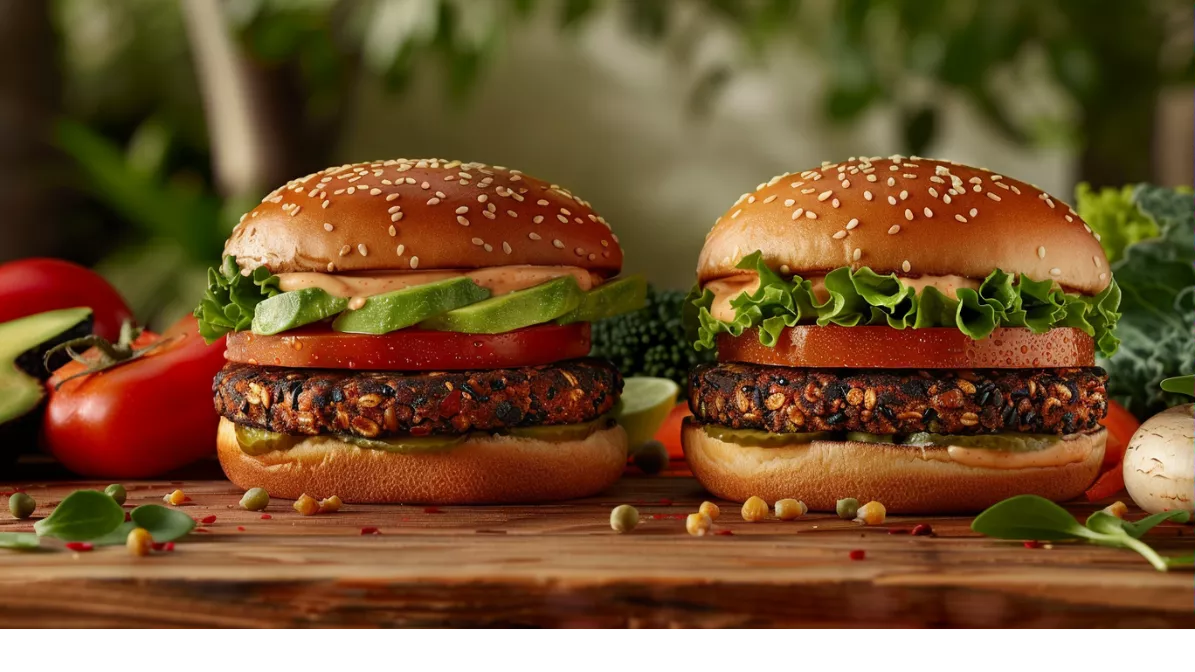
Comments are closed.